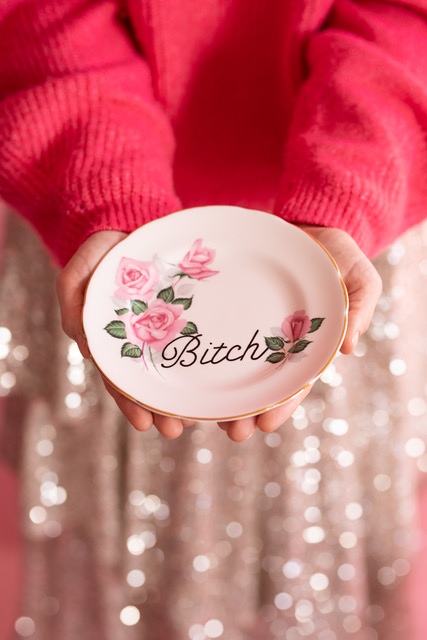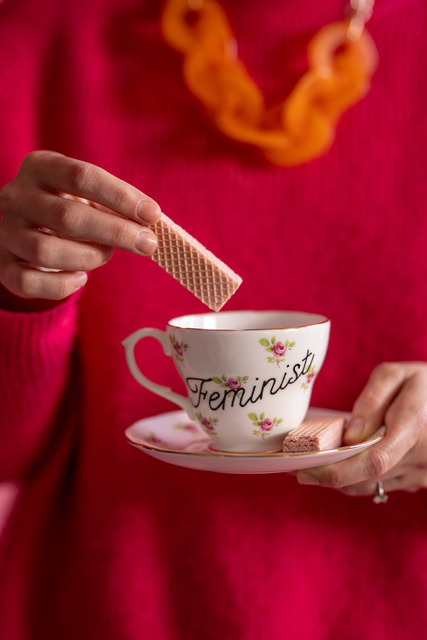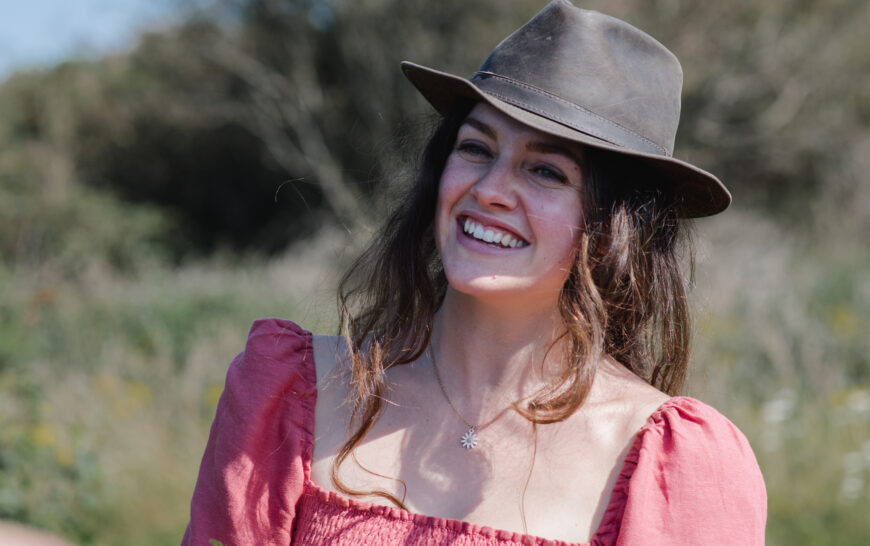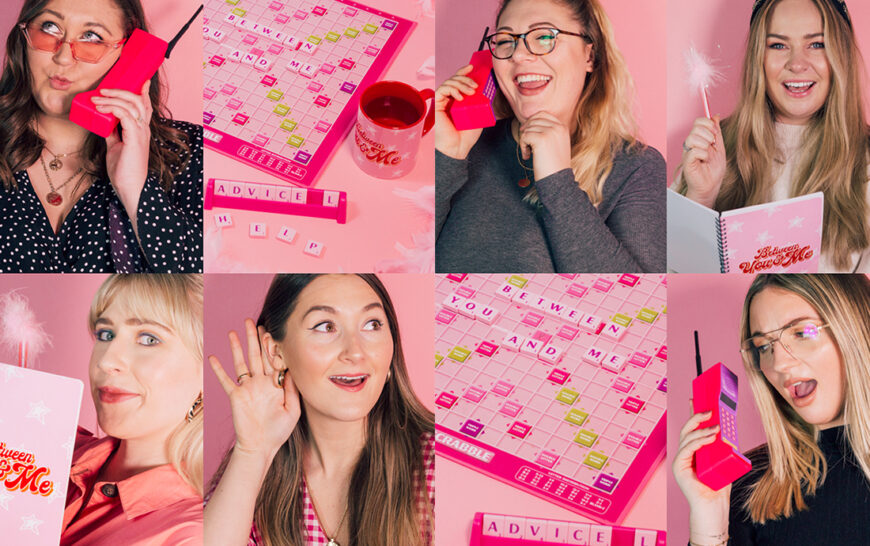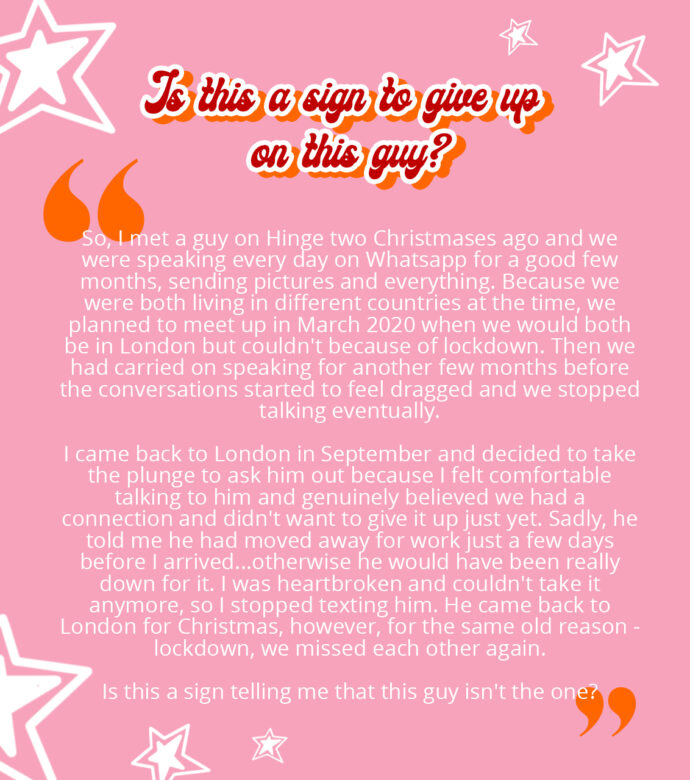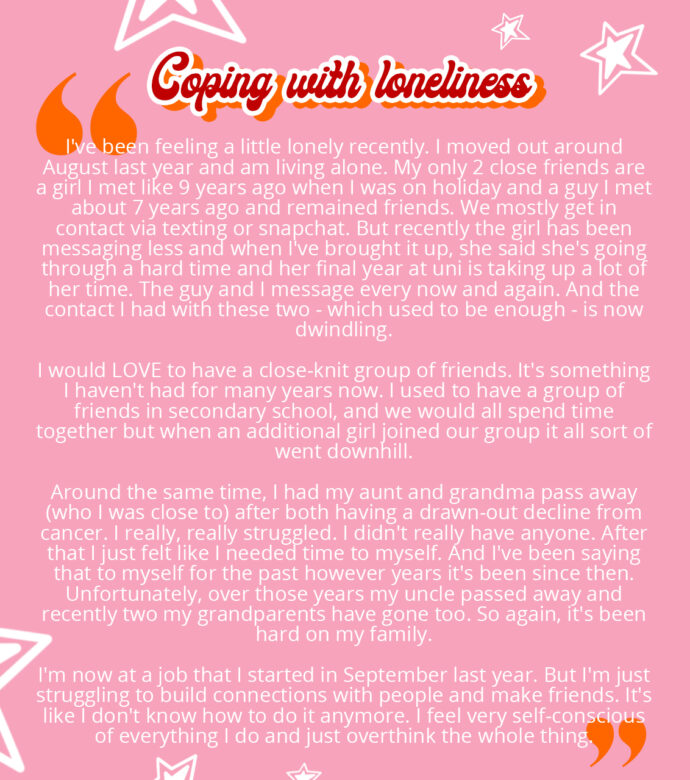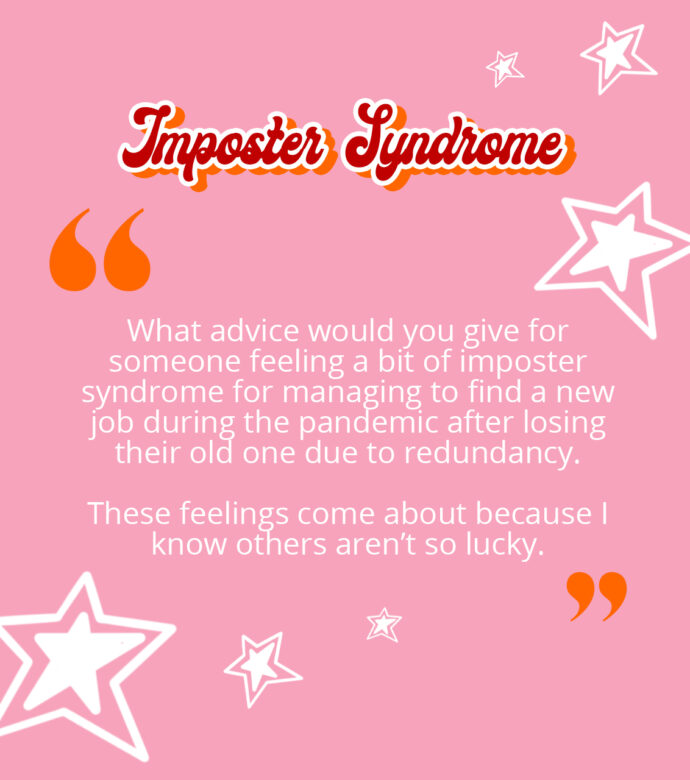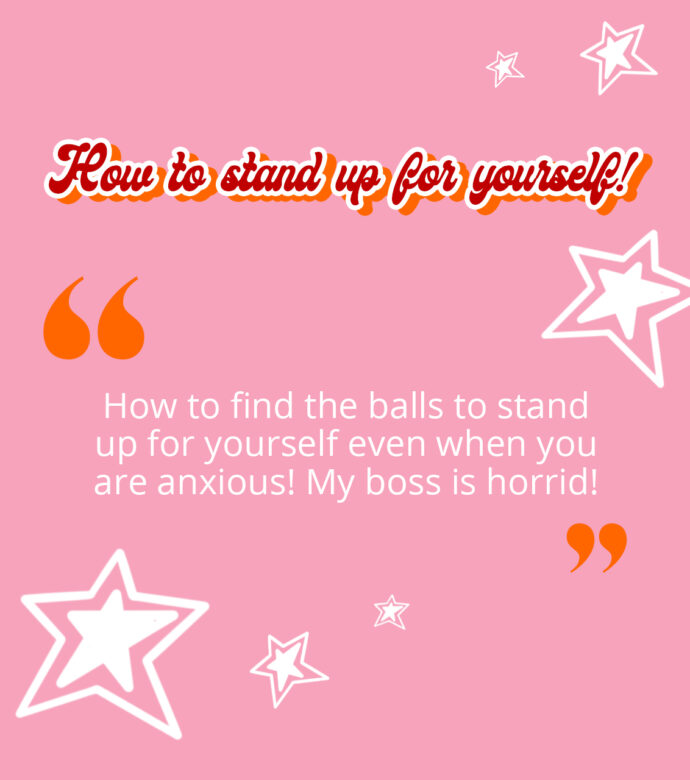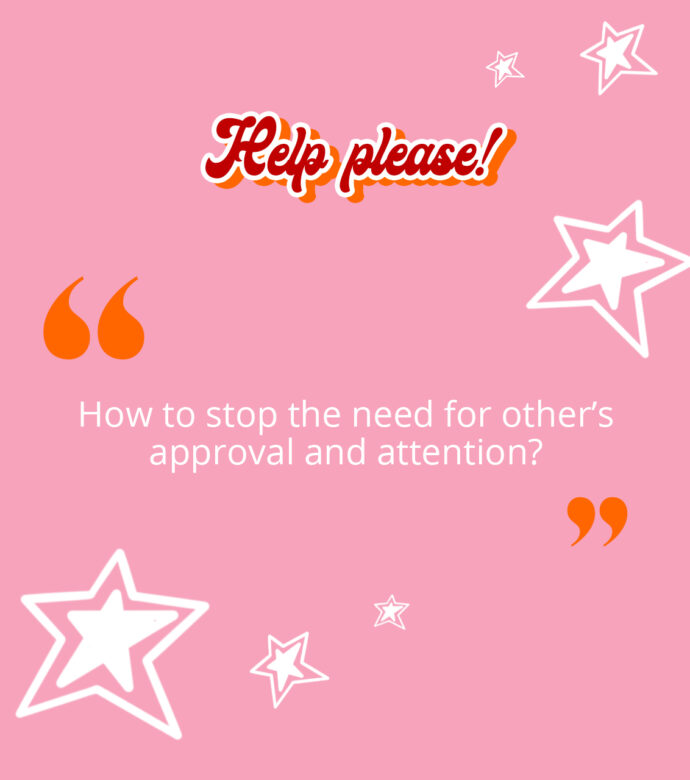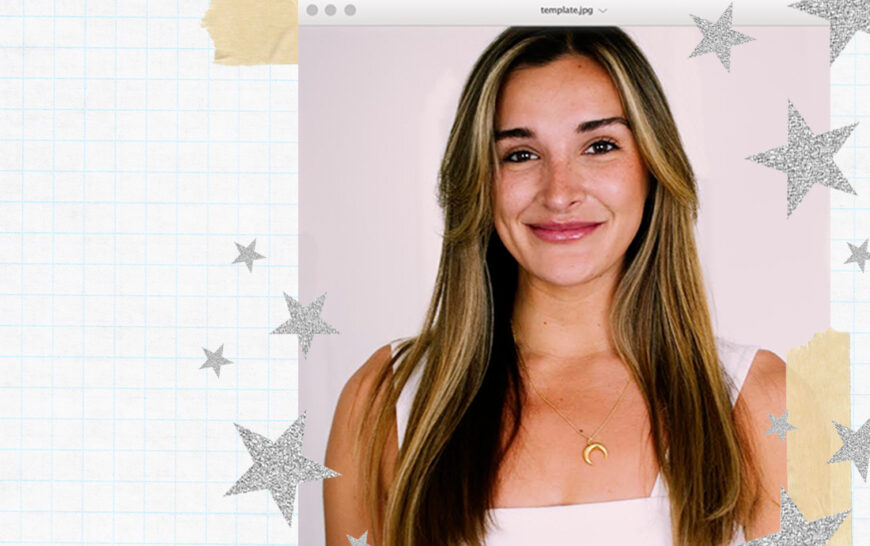
Sitting in a stuffy careers office aged 16, surrounded by musty sixth form decor and a somewhat clueless head of year pondering what you’ll be doing for the next 50 years, it’s no surprise many of us feel disillusioned by the career choices we make so early on in life with little information or intuition about what direction we should head in. Some follow the route ‘expected’ of them, are influenced by parents or friends or simply fall into a job that pays the bills but doesn’t necessarily light a fire of inspiration or motivation.
But all is not lost- you can escape the boss who gives you the Sunday night blues, the endless to-do list that never lets up and the industry you’re still not entirely sure how you ended up in. Introducing: those who do a career 180- a career cartwheel if you will. You’re never stuck and your job destiny is not fixed, and these inspiring folks reminded us of that tenfold. Transitioning from working in education to luxury candles, office roles to OnlyFans, teaching to designing vintage china, HR to crisis counsellor and supermarket worker to 999 call taker, there’s proof in the pudding that changing careers or industries later in life is more often than not, a risk worth taking…
Having spent decades of her career working in corporate roles, 47 year old Nichola, based in Houston, Renfrewshire, took the plunge and lept on her ‘now or never’ feeling and launched Olapip Home, a luxury hand poured home fragrance business 5 months before lockdown. Having always loved fragrance and cosy interiors and with a growing frustration at expensive candles that didn’t burn as well as she’d hoped, Nichola ventured into the unknown in starting Olapip and hasn’t looked back since…
We adore the Olapip ethos and really admire how much success you’ve achieved in just under 2 years since your initial launch! You decided to change careers aged 45, what was it about this point in your life that made it feel right to take the plunge?
I wanted to make and create and use the marketing skills in my own business. I knew that if I didn’t make the leap at that precise point, I probably never would.Nichola
My background has always been marketing and I’ve worked in the economic development, finance and education sectors for over 25 years, some of which was spent in large blue-chip companies. In my last job, the role was changing and for various reasons, I decided that I did not wish to stay. Marketing consultancy was the obvious choice for me BUT at that point I was exhausted fixing problems. I fancied a change! I wanted to make and create and use the marketing skills in my own business. I knew that if I didn’t make the leap at that precise point, I probably never would.
As a candle lover, I was becoming a little frustrated with expensive large brand candles that did not burn particularly well – either tunnelling with much wax left on the side of the candle jar or a black soot residue around the top of the container – so I wanted to explore to see what I could produce.
So, after a spell of training, continuous researching, testing, tweaking, retesting…and finally leaving my marketing profession, Olapip Home was born.
Could you tell us a little bit about your business and the day to day running of it? What does it mean to run a home fragrance brand?
Olapip Home is a hand-poured home fragrance business offering ‘a little luxury in a sustainable way’.
All our soy wax candles, wax melts and reed diffusers are carefully crafted to produce elegant scents for the home or workplace and are made in the Olapip Studio in Houston, in the countryside on the outskirts of Glasgow. Olapip’s luxury home fragrances create a delightful ambience in any space, and with citrus, fresh, fruity and floral to oriental, woody, masculine and seasonal scents – there really is something for every taste.
Our ethos is all about offering a little luxury in a sustainable way and I was determined to develop a brand with a conscience and to not be wasteful. I limit the use of plastics and encourage customers to reuse, refill and recycle. When the candle has finished, customers can return the clean jar for money off their next order or repurpose it – plant low maintenance succulents in it, use the jar as a pen pot or to hold your favourite make-up brushes.
Day-to-day running of the business involves sourcing the raw materials, hand pouring lots of products, marketing/social media/digital activity, selling online, in-person and at events, processing customer orders, keeping log of sales, outgoings, finances and all the other admin that goes with running a business. Oh, and trying to finish my website! I operate with a Facebook shop and to order, customers can message on Facebook/Instagram or email me. The website was about 90% complete when the business went crazy so I never quite got round to finishing it (the shame, I should really have sacked myself!).
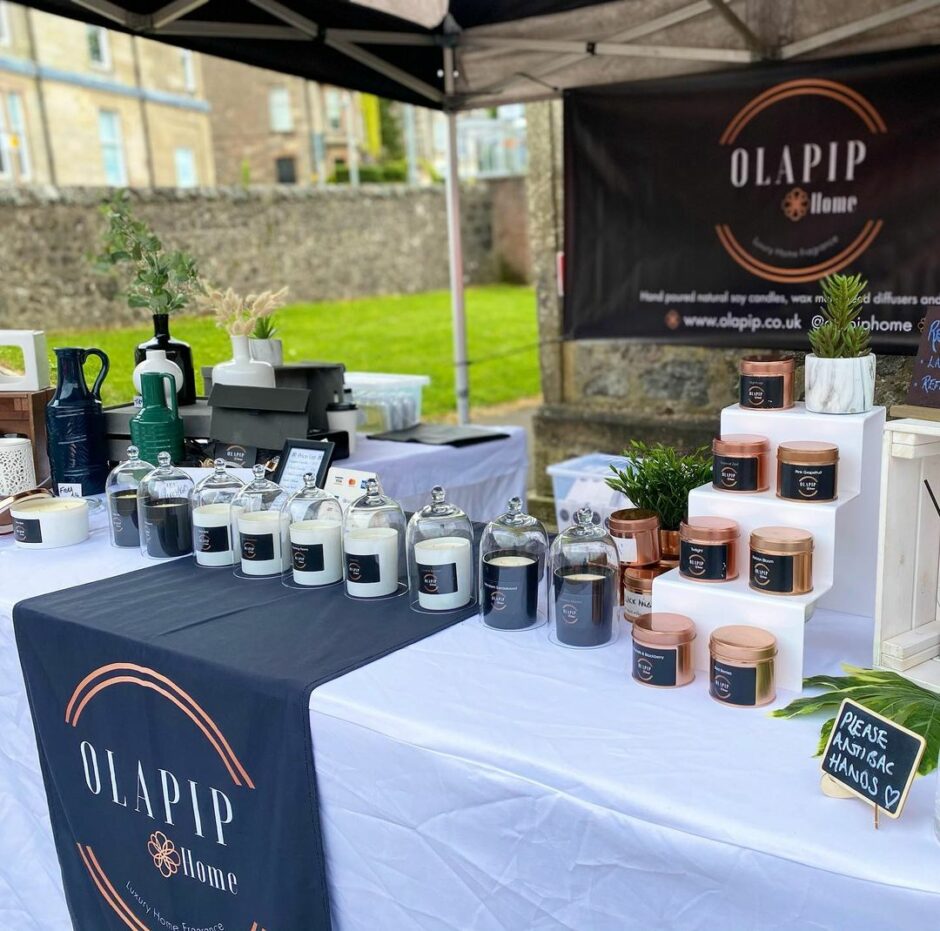
How long did it take you from thinking about changing careers to making the move?
Around 5 months. I was still working but in my spare time at home I was experimenting and testing. I set up a research group to test scents and products and the feedback was fantastic with a resounding ‘You’re onto something’ being a consistent comment. So, I left my job in May and spent the next 4 months bringing the product range and branding together for a launch in September. It was a giant leap of faith but something that I was so passionate about.
Did the pandemic impact your priorities and feelings towards what you wanted to spend your time doing and the things you really valued?
Well, I launched only 5 months or so before lockdown and goodness when that hit it was, without doubt, a scary time…in so many ways. What would happen? Would we survive? The doubt. The fear. The unknown.
As a very new business I did not qualify for any of the government assistance but I was determined to save the business and to keep going where possible, to adapt our offering and to continue to fill homes and workplaces with our gorgeous scents and homewares. As a result, I set up a contactless collection box from which customers could prepay and collect their orders, I offered local delivery assuming it was en-route to fetch provisions, I shipped throughout the UK and eventually, as pockets of retail re-opened, I set up an outdoor shop.
Bizarrely, lockdown helped the business to grow as people’s shopping habits changed by shopping locally and gifting to friends and family all over the UK. It was all about a little joy and peoples’ general wellbeing. Some customers loved our scents from a sanity point of view as it was their tranquil time in a world full of fear – lock the bathroom door, light the Olapip candle, relax in the bath and breathe. For others it was suddenly having a home full of children, husbands, wives and pets and they desperately needed scent to mask absolutely everything!
For me personally I’d never worked harder in my life keeping up with demand and I was slightly envious of those ‘lucky’ to be furloughed having all this unexpected family time. I just went into coping mode – trying to run the business, home school, keep my daughter protected and look after vulnerable family members who were shielding. But all the time I did feel very fortunate that Olapip was home-based and that every day I could be there for my daughter at what was an incredibly scary time for all.
The whole episode just seemed to focus on survival.
Were those around you supportive of your career change and move to self employment?
Absolutely. Even the business name represents the support I had.
Olapip: a little bit of me – Nich’ola’, my daughter – ‘Pip’ who was hugely excited when I told her I was leaving my job to start a completely new venture – and also two of my husband’s letters are there…all in the interest of fairness of course! My husband builds things for me, keeps me calm and has a brilliant operational mind, my mum labels and packages the products, my daughter makes boxes, counts diffuser reeds and labels bags, my sister helps at events and being a social media guru I may just need to hand that task over to her!
I love that the ‘Olapip’ name includes my family which makes it even more special. They have been hugely supportive and understanding and for me that is incredibly precious. It’s scary taking that leap but with super-supportive family and friends behind me, it made it all a little more reassuring.
What was the biggest challenge in setting up your own business?
The juggle! There’s no doubt about it, running your own business IS hard. You wear many hats. From having always had a team to share tasks with to suddenly becoming what is effectively the ‘full organisation’ i.e. R&D, manufacturing, procurement, marketing, sales, finance, HR, compliance, etc, the to-do list is endless and you never really manage to switch off.
My challenge is always time and taking on too much – but I think that’s just the way that I’m wired.
I would say do your research, know your market, have a plan (and be prepared to adapt it), get your processes in place. Use free resources available to you – Business Gateway training courses, courses or templates offered by your business bank, there are some great Instagram accounts for small business advice or tax/finance help.
It can also be lonely, so find your gang – join some business networks, there may be some local business groups on Facebook who meet up for coffee and a chat. It’s good to get out of the business to bounce ideas and gain a sense that you’re not alone – share the fear, excitement, confidence, successes…depending on which hat you’re wearing that day!
Yes, it can be daunting, but it’s all the more enjoyable and rewarding when you have such amazing support from your customers, family and friends…and if you believe in, and love what you do.
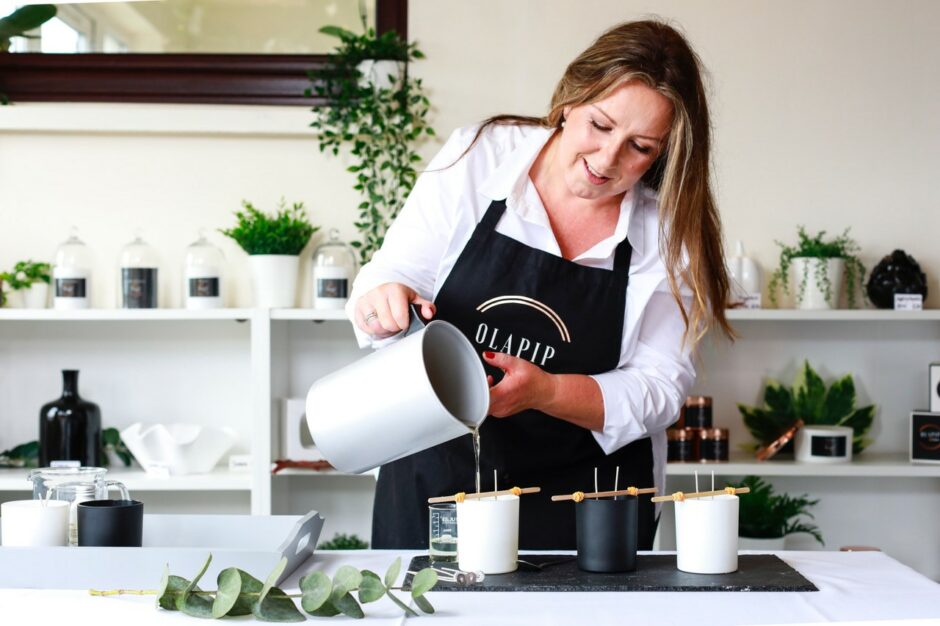
Which skills would you say were most helpful from your role in education to transfer to your new and totally different career in home fragrance? Do you think it helped you in any way having worked in a totally different industry previously?
I have a business and marketing degree so there’s a general foundation present and I have spreadsheets for everything. I also have an understanding that building a brand isn’t just about marketing – it’s every single contact your business has with your customer/potential customer. What you say, how you say it, what you produce, what and how you deliver and, equally, how you handle any dissatisfaction.
Communication – talk to your customer, get to know them. I love chatting to customers, describing our range, taking them on a scent journey and helping them discover new fragrances. Scent evokes memories and it’s lovely when presenting a product to them you see a smile spread on their face and hear the words ‘Ah, that reminds me of…’
Also Resilience – the ability to experiment, to fail, to succeed, to take compliments, to take criticism and to adapt…and boy have we had to adapt continuously in the last 18 months.
I’ve worked in 3 very different industries and some of those roles were also business to business which helps with the wholesale/stockists side. But I think the consistent element is always knowing your customer.
How has your quality of life and happiness been affected since changing careers?
Oh my goodness, I thought I’d have a much calmer, creative life making candles in my home studio, the doors would be open, the birds would be singing and life would be ideal! In reality, I’ve never worked harder, I don’t get paid annual leave (unfortunately) and my boss is an absolute taskmaster (he he)! People often say ‘You’re the boss, you choose your hours – it’s simple.’ That’s exactly what I’d be saying if roles were reversed. But if you don’t do what’s on your list, no one else is going to do it for you and the list just grows.
I do work a lot of weekends and I know I need to be stricter and take time off during the week to switch off and rest or I will eventually suffer. But the difference is I’m working hard for MY business.Nichola
Every element has its pros and cons. I love working away in the studio and being at home when my daughter comes in from school, but the mess that sometimes spills out from the home studio into areas of the home is not ideal and the studio just sits there always goading me to do more. Many will be able to relate to that home-working situation right now.
I’m not going to sugarcoat it, I do feel quite stressed with the workload at times but I need to work out when I’m taking that next step to outsource more of the admin to free up time and headspace. I don’t have a commute to/from work which can help distinguish between work and home, but a dog walk with a coffee straight after the school run helps to focus the mind and kick-start the day.
I do work a lot of weekends and I know I need to be stricter and take time off during the week to switch off and rest or I will eventually suffer. But the difference is I’m working hard for MY business.
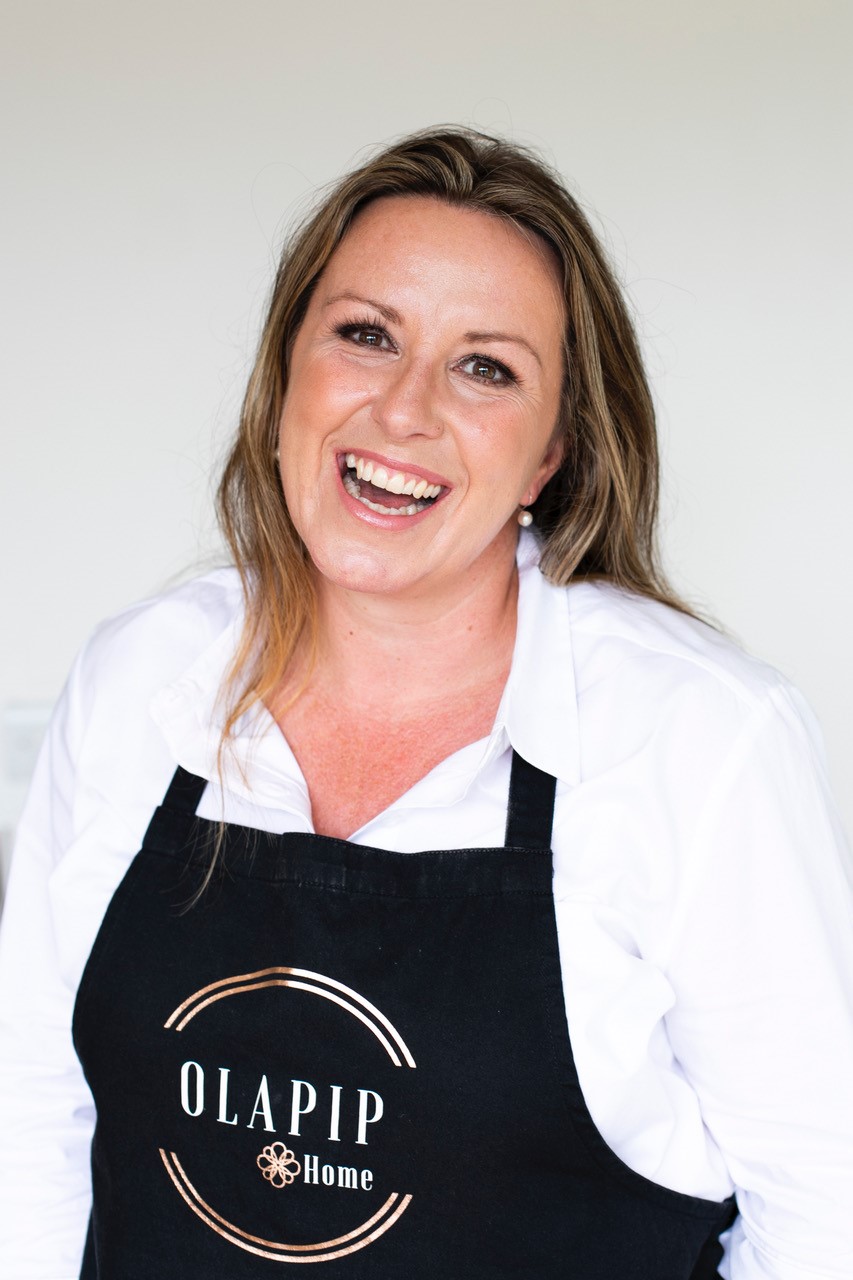
What’s your best piece of advice for anyone considering a big career change?
If you’ve done your research, go for it. I’m proud that I had the guts to take that giant leap of faith and that I bring a little scented happiness into peoples’ lives.
I’ve just had my 2nd birthday and I keep thinking how the heck did that happen? In some respects it’s hard to remember life before Olapip, but on the other hand it has absolutely flown by…so that must mean I’m having fun!
You can shop from Olapip Home via their Facebook page (www.facebook.com/olapiphome/shop), shop at Nichola’s home studio in Houston, Scotland, order to collect locally or with shipping throughout the UK.
Emma Wakely of Beau & Badger is currently living the dream running her cheeky vintage china business, but her positivity and motivation for creating a successful business wasn’t always present after she was forced to quit her previous dream job as a primary school teacher after sustaining a back injury that left her unable to work in the classroom. Moving from being active and able bodied to using a wheelchair, Emma describes feeling like her “life was over” and being left behind by her peers who continued in their successful careers as her lifestyle was forced to do a 180.
After making a one-off vintage plate design for her mum, Emma decided to try her hand at selling her designs and soon had a successful and thriving business on her hands, stocking on Etsy, selling at local markets and amassing over 10,000 followers on Instagram. Her cheeky fine bone china is a crockery lover’s dream!
Unlike some who decide on making a big career change, you were forced into it by external circumstances. Did you ever imagine you would feel grateful for this shift in your life at the time of your injury?
Once I didn’t have my health, something that seemed so important suddenly wasn’t anymore. I had time to step back and focus on the things I really enjoyed.Emma
At the time of my injury, I thought my life was over. The hardest part was seeing friends progress in their careers and achieve things that were in my ‘life plan’. Coming to the realisation that I could no longer physically teach was one of the hardest things I’ve ever had to do. I was very career driven and the plan was to become a headteacher. Once I didn’t have my health, something that seemed so important suddenly wasn’t anymore. I had time to step back and focus on the things I really enjoyed. It’s often easy to focus on the negatives but over time, I was able to see things from a different perspective. If you ask me today if I would ever go back to teaching the answer would be no. Beau & Badger is my dream job. Finding employment that works with a disability is difficult. Owning my own business allows me the flexibility of working when I am able to. I’m often up in the middle of the night painting swear words on teacups and that has been fantastic in helping me manage my pain.
Which skills would you say were most helpful from your role in teaching to transfer to your new and totally different career in cheeky vintage china?
Communication is key in teaching and is also important when running your own business. It has helped me deliver great customer service and build up a fantastic customer base all over the world. In teaching you need to be very organised. This has been invaluable in starting my own business. I try to keep on top of my paperwork and accounts as this can easily become overwhelming.
Did you always have an artistic side that you weren’t fully able to express in your day job or was this side of your personality only really brought out when teaching was no longer an option?
I’ve always been very creative and enjoyed making things. Teaching quickly became all consuming and I no longer had time to focus on my creative side. Since starting Beau & Badger I have had the opportunity to grow creatively and make a range of products I’m really proud of.
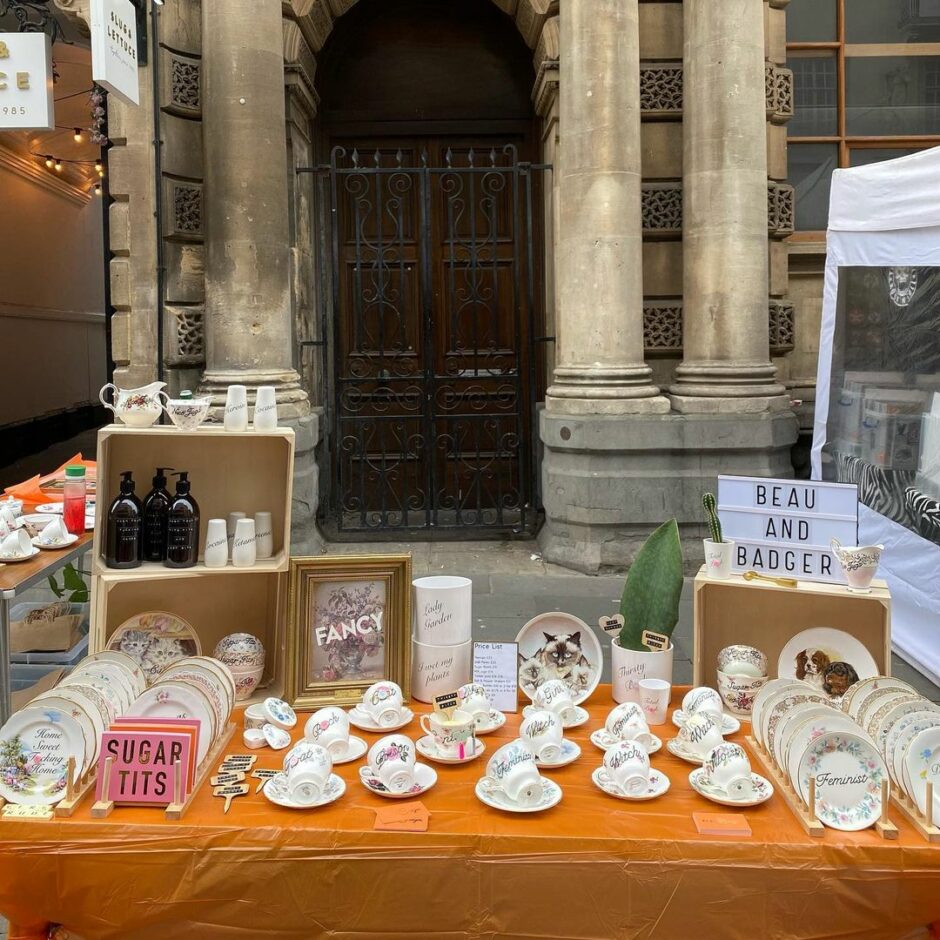
Could you tell us a bit more about how you took your vintage china idea from making a one-off plate design for your mum to running a successful business with over 10k followers on Instagram?
My mum has always been my biggest cheerleader. She gave me the confidence to put myself out there and start my business. When I sold my first plate on Etsy, I was ecstatic. Nothing beats the feeling of someone wanting to pay for your work. The orders started flooding in and I was getting lots of custom requests for swear words. This is when I realised I had found my niche and made the decision to focus on cheeky words and phrases. Starting Beau & Badger was a steep learning curve with a lot of trial and error. I had to work out quickly which products were worth focusing on and which weren’t. This allowed me to create a product range that people loved. Social media has been a fantastic platform for getting my work out there. We have a great community on Instagram that share a love for sweary china and small dogs (I share lots of pictures of my dogs Harry and Stella). This has been invaluable in growing my business to where it is today.
What was the biggest challenge in transitioning to working for yourself and in a totally different industry?
When I started out I had no idea of how to run a business- I learnt everything from YouTube videos and the Internet! I taught myself about product photography, editing pictures, how to grow on instagram, managing finances, branding and customer experience. It was challenging but I really enjoyed learning something new. It gave me something positive to focus on when things were hard.
What’s been the biggest highlight of your new career so far?
I absolutely love meeting customers. Most of our sales are online, meaning I don’t get to do this as often as I would like. A highlight for me was the Bristol Christmas Market. I met so many lovely people that I found the perfect gift for a friend. This is what my business is all about. I love the meaning words hold for people. It could be your best friend’s nickname or something that reminds you of that ‘had to be there moment’.
How has your quality of life and happiness been affected since changing careers?
My life is now completely different. I am so much happier and less stressed. I can focus on the things that are really important to me, my family, friends and being creative. I’m always thinking of new things to bring to the shop and no day is the same. I absolutely love what I do and am so grateful that I had the opportunity to take a step back and turn something difficult into something positive.
What would you say to anyone else who may find themselves in a situation in which they suddenly have to change careers because of circumstances out of their control?
Even though it feels like the end of the world, it really isn’t. Dwelling on something you can’t change isn’t helpful. Focus on the things you can change. Take the time to really find what you enjoy and what makes you happy. Don’t be afraid to give something new a try. You never know it might be the best thing you ever do.
You can find Beau & Badger on Instagram at @beauandbadger or shop Emma’s designs via her Etsy store here.
Whilst Lauren was only 22 when she decided to change career paths, her decision to move from a traditional office job to creating adult content for OnlyFans was a dramatic change of pace and lifestyle for both her and her family and friends. Feeling she had nothing to lose and unfulfilled by her office roles following sixth form, Lauren’s life changed overnight as she went from making 19k a year to 19k a month on OnlyFans.
How did you get into your original social media/office role and was this something you were excited to be a part of originally?
After sixth form I went to a secretarial college and studied to be a secretary. I learnt in depth Microsoft packages, shorthand and more. I felt really prepared for the working world after I left there. I applied because I was interested in social media and websites. I felt that it was within my capabilities. I was extremely excited to start my social media job. I had a few jobs after leaving college. I worked for a fashion designer for a year and the social media and website job was my second full time job. I was only 20 years old at the time.
In the 2 years you worked in an office environment did you ever feel like this was the right job for you?
It was not until cracks started to show and my nightmare manager showed his true attitude towards me that the job began to take a huge toll on my mental health.Lauren
I definitely felt like it was the right job for me. After my first year I was given a raise and there was a time that I felt happy in the office there. It was not until cracks started to show and my nightmare manager showed his true attitude towards me that the job began to take a huge toll on my mental health. I lost a lot of weight and became an insomniac. I felt like no matter how hard I tried it was never enough for them.
Was the move from PAYE to self employment a big appeal in changing your career path?
I have always wanted to be my own boss. When I was a child I used to imagine what kind of business I would start. Before I began OnlyFans, whilst I had my old job I posted loads of bikini selfies on Instagram and this used to make me feel good about myself. Ultimately starting my own business made me feel like I was taking back control in my life. No one could tell me that I was not good enough at anything apart from myself!
What was it about OnlyFans specifically that appealed to you? Have you worked in the adult industry before?
I had never worked in the adult industry before. I always used to look at girls like Kelly Brook and Rosie Jones growing up and I wanted to be a page 3 model but the glamour industry has changed a lot since then. The main thing that appealed to me was independence and that I could be in control of my own life and happiness again. Ultimately, all I wanted was my happiness back.
Are there any drawbacks to being self employed that you didn’t experience whilst working in an office environment?
Overall the positives outweigh the negatives. Tax is not fun and the strange thing about becoming a business owner is you are expected to know everything about it including all of the terminology as soon as you start! I think it can be a lot more lonely in the day. However I would rather be by myself than in a toxic environment like my old job where they used to bitch about me when I left the room.

Has it been difficult to navigate self employment during a pandemic?
The pandemic actually positively affected my business because people spent a lot more time at home. There was not really much change to my job apart from I could not go to photoshoots for my Instagram.
Was there any judgement and concerns from those in your inner circle about taking this risk and how did you manage those emotions if so?
When I first began OnlyFans, my own family did not agree with me which was really hard considering I lived with them! I lost a lot of friends and that was extremely mentally challenging for me. I found that even if someone wanted to be my friend and did not agree with my life choices I could not relax around them and always felt like I needed to justify my life choices. Which, sadly, came off as boasting because I was insecure.
When my family saw how happy I was and that I was in control of what I did they were happy for me and supported me. But it did take time!Lauren
Usually, explaining to people the money involved and the freedom granted by my job and lifestyle helps them understand my choices with many people saying they wish they did the same! When my family saw how happy I was and that I was in control of what I did they were happy for me and supported me. But it did take time!
How has your quality of life and happiness been affected since changing careers?
My life right now is like a dream compared to my old life. I am one week away from closing on my first rental property and I live in my dream house in the Cotswolds. I honestly could not have even imagined this being my life when I was sad and depressed at a normal job.
I understand now that I was extremely lucky and this does not happen for everyone starting this career. I was in a BBC documentary last year called Nudes4Sale and in the documentary it explores a few people’s experiences on the platform including mine.

Have there been any downsides to making the move?
The biggest downside and something I did not foresee is that my identity completely changed. I was no longer just Lauren anymore, I am “the OnlyFans girl”. People in my hometown would stare at me and sometimes say negative things to me whilst in public. It used to really mentally affect me but now I tend to just avoid negative people and I have moved away from my hometown!
Another negative is that whatever I put out onto the internet I will never be able to take back. It will follow me around forever. Also, in this industry a lot of your content ends up being sold by people on the Internet pretending to be you or published to websites without your permission. I had to hire a team to help me with this issue but it is always ongoing and my content will never be just on my paid site. It is just something I have had to accept.
What’s your best piece of advice for anyone considering a big career change?
Before changing careers I would absolutely recommend thinking about the positives and negatives of the move. When I made my career move I honestly was not in a good place and I just felt like I had nothing to lose. When you hit rock bottom the only way to go is up, and that’s what I did.
Ask yourself, do you really want to be working for someone else your whole life? Knowledge is power and if you know what could go wrong you will be better prepared for it.
You can find Lauren at @1laurenelizabeth on Instagram
Having finished studying Communications and Human Resources at University in 2013, Canadian graduate Pamela struggled to find a job and ended up travelling and volunteering through her mid to late twenties. During her time volunteering in South Africa she discovered a love for crisis counselling and social work, and returned to Canada in 2018 to study this further. Pamela has just graduated aged 29 with a Master of Social Work which qualifies her as a psychotherapist and has never felt happier in her working life…
How soon into your studies and work in comms and HR did you realise the sector wasn’t for you?
It was towards the end of my last year when I realised I didn’t want to work in comms and HR. All of my classmates were discussing applying for jobs and preparing for the certification exam required to practice HR where I live. While I’m usually very studious and enjoy learning, I knew I wasn’t invested enough in the field to prepare for the exam the way I needed to, so I completed the year but never sat the exam.
Did you ever consider quitting your studies at the time or were you hopeful that this industry might be right for you when it came to finding a permanent job?
I never considered quitting my studies. I think because I wasn’t entirely sure what I wanted to do, I didn’t want to quit to ‘do nothing’. I’ve always wanted to do work that makes a difference, and figured I would apply for comms and HR jobs that were in line with that like comms and HR for the police department or a hospital, or children’s aid society. I didn’t necessarily want to work on the ‘front lines’, but I wanted to do work that mattered and thought this could be a good way to do that so I stuck it out.
How did you come across social work/crisis counselling and what was it about it that drew you in?
I decided then that if this is the work that I love to do, I wanted to be trained to do it well. I knew I needed to return to school to be able to do that. Pamela
After my studies while I was still unsure of the career path I wanted to take, I started travelling. I was fortunate to get to volunteer, work and visit countries across North America, Europe, Asia and Africa between 2014 and 2018. I ended up loving South Africa and staying there for the better part of two years during that time. In South Africa I volunteered at a non-profit organization running programs in different communities across Cape Town. I worked most closely in a community called Mitchell’s Plain, where the crime and poverty rates are quite high, running programs focused on literacy, scholarship, and personal empowerment. During my time there, I had the opportunity to work both directly with kids and youth in the community and behind the scenes developing curriculum and conducting research about launching new projects. I started to think about what I loved about the work I was doing in Cape Town and how I could continue that work in Canada (where I’m originally from). After a lot of thought, discussion, brainstorming, and pro/con lists, I determined the parts of the work that I loved in Cape Town, most closely resembled social work.
The tipping point for me was when a young girl who attended our programs died suddenly. I was a part of a group that went to run our personal empowerment program with the girl’s classmates, but I felt ill equipped to provide them with the support they needed which was crisis and grief counselling. I decided then that if this is the work that I love to do, I wanted to be trained to do it well. I knew I needed to return to school to be able to do that.
Could you tell us a bit about this industry and what your day to day role looks like?
Today, I am still in Canada working as an inpatient hospital social worker and I also run a small private practice as a psychotherapist. At the hospital, the role is varied day to day but includes supporting patients and families as they learn about new diagnoses, make decisions about end-of-life care, transition from home to a more supportive living environment like a retirement or nursing home, and any other ‘social factors’ that may be contributing to their hospital stay.
In private practice, I work virtually with youth and young adults experiencing anxiety, depression, life transitions and grief. We work together to develop coping strategies and greater tolerance for challenging emotions.
What was it you were seeking from your new career that wasn’t being fulfilled in communications and HR?
I always knew I wanted to do work that made a difference but had no idea what that would or could look like. Comms and HR likely would have been mostly if not all behind the scenes which I thought I wanted at the time, but I discovered working in Cape Town that I liked being able to work directly with people as well as behind the scenes. It’s important to me to feel connected to the work I’m doing so it feels meaningful, which is something I didn’t know about myself when I originally decided on comms and HR.
How has your quality of life and happiness been affected since changing careers?
There’s something so special about doing work you’re passionate about, that feels like just the right fit. There’s also a sense of gratitude I have going into every day knowing that I could have been on a very different path if I had believed returning to school so late wasn’t an option for me. Knowing that I was very intentional about choosing this work/ path, and that I didn’t just fall into it makes me feel very happy and fortunate. I also work (and studied) with the very best people. Social work can be emotionally taxing, but it’s work that I love and find very meaningful. Working with people who feel the same way, who I can both laugh and cry with, is very special.
Have there been any downsides to making the move?
The hardest part for me was leaving South Africa. I had built a life and home there, many of my closest friends are still there. But as hard as the goodbye was, once I figured out what it is I wanted to do, it was a no brainer.
What’s your best piece of advice for anyone considering a big career change?
One thing I kept in mind when I returned to study, knowing it would take three years, was that ‘the time will pass anyway’. If you’re considering a big career change but are hesitant because of the time it might take to complete, the time is going to pass anyway. I figured I might as well spend that time getting closer to my goal. Now that I’m on the other side of it doing work that I truly enjoy, I can say it was 100% worth it in my case.
33-year-old Siana had been working in a supermarket role since the age of 17 before taking the leap of faith and deciding to complete training as a 999 call taker for the ambulance service. Entirely different from her previous roles, she has found herself oftentimes in disbelief that this new job is hers, and her story is the ultimate testament to leaping with confidence out of the box you might have placed yourself in.
You had spent 15 years working in a supermarket since being a teen- the entirety of your working life! What inspired you to take the plunge aged 33? Was there a lightbulb moment?
For me it was that I was just stagnant, that although day to day I was ok and work wasn’t necessarily difficult maybe that was the problem, I was just comfortable. I worked with some really great people and it took me a long time to realise that I needed more. I needed to do something that made a difference, something I would have to challenge myself with.
Saying that, I never thought I could do something like this, especially such an important role! My friend’s partner came into work as a customer and I remember he asked why I was still there! After all this time – and truthly it wasn’t an easy question to answer – I laughed and said I must love it really! Later that evening he sent me a link for an emergency call handler for the ambulance service – I genuinely laughed – Not a chance would I ever get something like that! That there’s absolutely no chance! The day before the closing date I just decided to go for it, nothing changes till you change, am I right?!
Were you nervous about taking the plunge or excited about a complete change of pace in the early stages?
My application form took a long time to complete and I sent it off with the thought that at least the job application process was some practice! After all it was a long time since I last applied for a new job – The assessments were tough, typing tests, accuracy reading tests, call taking assessments and more, but when I got the email to say I’d passed them I felt proud of myself and I think it’d been a long time since I had. After the interview I just felt like no matter what happens, I did my best – when I got the call to say I was successful, it was like a light shining inside of me I know that sounds ridiculous but I was so happy I can’t even describe it. I called my mum straight away! I still feel that little glow now when I think this is what I’m doing.
Now to the hard bit – it’s a serious job, as a friend of mine put it. It’s a proper grown up job! There’s so much to learn, many processes and protocols to follow. I often feel like I can’t take anymore information or my head will explode!
Were you at all worried that not having prior experience relevant to working in healthcare would hinder you in changing careers?
On the day of the induction, there were 11 of us starting and straight away I noticed that I was the oldest, the others were all much younger than me. During the ice breaker where you have to stand up and introduce yourselves (I’m sure everyone hates it!) I stood up to introduce myself and said a little about myself – luckily I was first, as when everyone else stood up I became very self conscious and felt out of my depth.
I was taken on because I have many transferable skills – each day I remind myself of this, each day I tell myself that I am brave, I’m hard working and I can do this!Siana
All the others had a degree, they all were really clever and almost a decade younger than me too! Many had experience within the NHS or police service too and for a lot of that morning I felt like I was taken on by mistake, my brain going mad – I’d left a secure job, what am I going to do about rent?! Would I have to go back to the supermarket with my pride completely bust? The good news is – no, I wasn’t taken on by mistake. I was taken on because I have many transferable skills – each day I remind myself of this, each day I tell myself that I am brave, I’m hard working and I can do this! That my age brings experience with people, that my previous mistakes make me wise and that I am learning each day to challenge myself.
How has your quality of life and happiness been affected since changing careers?
Each day I start with a little nagging voice telling me I’m not good enough but each day I learn more, the system starts making a little more sense, I’m understanding protocols and really pushing my brain to work, each night I go to bed exhausted but feel a sense of achievement.
I’d love to say that I’m completely rocking it but I’m not. I’m struggling every day to keep my head above the water – but I am doing that with my new colleagues – all young, all attractive, all intelligent and all absolutely lovely colleagues! Yep! They are all lovely! We are all struggling, we are all pushing ourselves and we are all so supportive of each other.
So, all I can say is yes, I might not pass my sign off, and I might fail my exams but I’m doing the best that I can every single day and I’ve never been so mentally drained, but I’ve never been prouder of myself either. It may all go wrong and I may not succeed but life is for living and life is for the brave, so here I am being brave.



